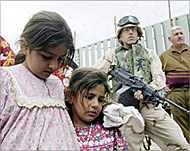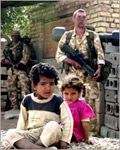Iraqi children killed in ordnance tragedy
Several Iraqi children were killed and others wounded when an unexploded munition they were playing with detonated, according to the United Nations.
 |
| Iraqi children are at risk from live ordnance |
United Nations spokesman David Wimhurst said that “nine children were killed and seven were injured in Missan governorate on Monday when they were playing with unexploded ordnance”. Missan is southeast of Baghdad.
“This tragedy highlights the terrible danger that unexploded ordnance represents all around Iraq,” Wimhurst added.
Kathryn Irwin, a spokeswoman for the UN Children’s Fund (UNICEF), said the weapon was an Iraqi rocket. “There are thousands of stockpiles of weapons in Iraq,” she said.
Malnutrition increases
It is not only discarded explosives that pose a grave threat to Iraq’s children. More than 300,000 face death from acute malnutrition, twice as many as before US and British forces invaded the country in March, the United Nations UNICEF agency warned on Wednesday.
Many of these could be saved if the occupation forces ensured that aid convoys could move around freely and kept looters away from water plants and pipelines, according to UNICEF’s representative in Baghdad Carel De Rooy.
 |
|
Iraqi children hoping to pick up |
“We knew going into the war that Iraqi children were poorly nourished, but these findings make clear that not enough is being done to turn the situation around.”
“Instead, it has gotten worse,” says De Rooy, whose comments were issued by the UNICEF office in Geneva. Unsafe drinking water was playing a major role in the crisis.
The agency, charged with protecting children around the globe, said a survey taken in Baghdad indicated that 7.7 percent of children under five in urban centres were suffering from acute malnutrition, nearly twice as many as one year ago.
“We know the risks that Iraq’s children face, and we know what to do. But we are humanitarian workers, not police. Secure aid delivery equals effective aid delivery.”
Several weeks after US and British troops took control of Iraq, the agency said it was “still calling on somebody to deliver that security”.
His comments were the latest in a series of complaints by aid organisations over the failure of the US military authorities to restore public services and put an end to widespread looting, including of heavy equipment.
The Swiss-based International Committee of the Red Cross says that although many hospitals in and around Baghdad are functioning again, they still suffer from shortages of electricity and water.
Deadly disease
 |
|
Poor water quality in |
Last week, the World Health Organisation warned of a possible outbreak of cholera around Iraq’s second city of Basra in the south, under the control of British troops, because water supplies had not been reliably restored.
Aljazeera’s correspondent in Basra, Salam al-Ubaidi, reports that “the lack of medical equipment, laboratories and medicines makes it harder for Basra’s health departments to face the deadly epidemic. The action taken in the hospitals here is limited to clinical testing and diagnosing positive cases.”
Ali al-Tamimi, manager of Al-Tahrir hospital said: “Things will not be under control unless a government is established. If an authority is set up, there will be improvement to the drinking water network, and infections can be prevented.”